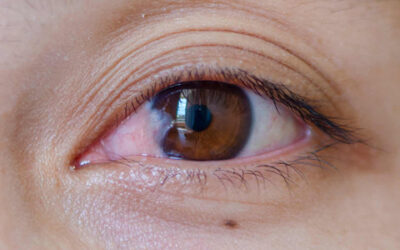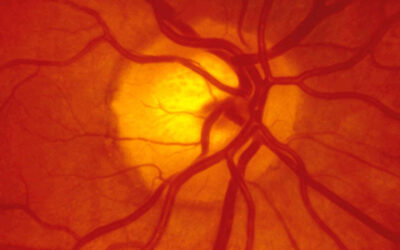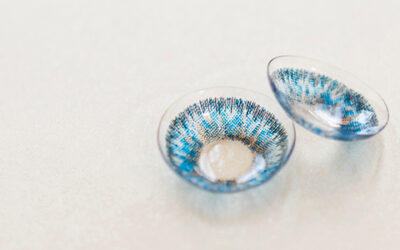How Do You Treat Shingles In The Eye?
When you’ve already gone through the itchy and painful experience of having chickenpox as a child, it can come as an unwelcome surprise to be reinfected with the virus again when you’re older. This time it’s the much more serious, and incredibly painful form – shingles – especially when it happens to affect your eyes.
Shingles is surprisingly common – as many as one in five of us will experience shingles in our lifetimes, and for one out of every 100 of us, shingles will also affect our eyes.[1] This can develop as a painful, blistering rash among many other troubling symptoms which can escalate quickly if not treated promptly.
So why do some of us develop shingles in our eyes and not others, what’s the best plan of action to treat it, and how long can we expect it to take to heal and get better? We’ve covered all of this in today’s article, as well as outlining why it’s so important to make an appointment with your optometrist as soon as you suspect you may have shingles in your eye,[2] as the sooner you get started with the appropriate antiviral treatment, the less likely it is that you’ll develop long-term complications.
How Do We Develop Shingles In Our Eyes?
If the virus happens to reactivate the trigeminal nerve, a nerve which carries signals between the brain and several areas of the face and eye, it can cause shingles in the eye. You’re at increased risk of getting shingles if you are 50 years or older,[3] under a lot of stress, or if you have a weakened immune system because of a disease like cancer, HIV infection, AIDS, or drugs that weaken your immunity including cancer or transplant medications.
What Are The Signs And Symptoms Of Shingles In The Eye?
When you have shingles in your eye, the blistering rash could appear at the same time as your skin rash, or weeks after the skin blisters have gone away, with only symptoms left in their eyes. You may experience:[4]
- Blistering on your forehead, tip of your nose, on your upper eyelid, or around your eye, usually on only one side of the face
- Burning or throbbing pain in your eye
- Teary or watery eyes
- Itchy and irritated eyes
- Blurry vision
- Extreme sensitivity to light
- Redness and swelling around the eyelid
- Difficulty moving the eye
You might also have swelling in other parts of your eye, including your:
- Retina, the light-sensitive layer inside the back of your eye
- Cornea, the clear layer on the front of your eyeball
Why Is Visiting An Optometrist So Important To Treating Shingles In The Eye?
Shingles in the eye is a serious condition that requires prompt treatment to prevent complications. It can quickly develop into a number of different complications that can have effects that last for months or even years that are difficult to heal, including scarring, long-term eye inflammation and pain, dry eye, infections, conjunctivitis, corneal ulcers, keratitis, uveitis, glaucoma, cataracts, and even vision loss.[5]
The most common complication of shingles is postherpetic neuralgia, which affects around 1 in 5 people who get shingles,[6] and happens when the shingles virus damages the nerves that connect the skin to the brain, resulting in chronic, severe pain that can last for months or even years.
Fortunately, visiting a qualified optometrist as soon as possible will greatly reduce your chances of these complications and help you to achieve a speedy and healthy recovery. Most people who receive prompt treatment after they first develop blisters will heal from their lesions and pain within 5 weeks with few or no scars.[7]
How Does An Optometrist Diagnose And Treat Eye Shingles?
To diagnose shingles in the eye, your optometrist will typically carry out a physical examination of your eye and ask about your symptoms and health history. They may examine your cornea, lens and retina more closely using instruments such as a slit lamp and an ophthalmoscope, to help them identify clinical signs of the condition both outside and inside the eye.
Treatment for shingles in the eye typically includes[8] prescription (by medical doctor) antiviral medicines that can help to stop the virus from spreading, help your blisters to heal, help the rash to fade more quickly, and relieve pain. Starting the medicine within three days after your rash appears can help you avoid long-term shingles complications.
Your optometrist may also prescribe steroid eye drops to help reduce swelling in your eye, and to keep the eye moist, antibiotic eye drops to prevent infections, and targeted pain medications if you develop postherpetic neuralgia.
Your optometrist may recommend that you use a cool compress at home, to soothe pain. To do this, ensure you use a clean cloth and water each time you prepare a compress, and gently apply it to your eye area for a few minutes at a time.
If shingles in the eye has caused other complications, you may need additional treatments, which your optometrist can determine based on your assessment and diagnosis.
What Should I Avoid Doing If I Have Shingles In My Eye?
Shingles is considered to be contagious until all of the blisters on the skin have healed, and someone with shingles can even give the virus to a child which can develop into chickenpox. To minimise your chances of passing on the virus to others, try to:
- Keep your blisters and lesions covered
- Avoid touching, scratching or picking at any blisters on your skin, as this will slow the healing process and can lead to infection. Blisters will eventually crust over and fall off on their own.
- Avoid close contact with others until your blisters have completely healed, especially those who have never had chickenpox or the chickenpox vaccine, pregnant women, young babies, and anyone else who has a suppressed immune system.
- Practice good hygiene by frequently washing your hands, not sharing towels, and cleaning clothes and bedding often.
- Avoid wearing makeup or contact lenses if you have shingles in your eye, as these can irritate your eye area and delay the healing process.
Don’t Leave Your Eyes To Chance: Book An Appointment With An Experienced Eye Health Professional
Shingles are a serious illness that can have significant effects on your vision and your overall eye health. If you have any symptoms of shingles in the eye or are concerned, we recommend booking an appointment with an experienced optometrist as early as possible to have a comprehensive eye exam and begin a targeted treatment plan to protect your vision and your overall eye health.
Book your appointment with one of our experienced optometrists today at your local clinics.
___________________________________________________________________________________________________________________________________
[1] https://www.ncbi.nlm.nih.gov/pmc/articles/PMC558704/
[2] https://www.ncbi.nlm.nih.gov/books/NBK441824/
[3] https://www.ncbi.nlm.nih.gov/books/NBK557779/
[4] https://www.ncbi.nlm.nih.gov/pmc/articles/PMC558704/table/tbl1/
[5] https://www.ncbi.nlm.nih.gov/books/NBK441824/
[6] https://www.aafp.org/afp/2017/1115/p656.html
[7] https://www.ninds.nih.gov/health-information/disorders/shingles
[8] https://www.ncbi.nlm.nih.gov/books/NBK557779/




